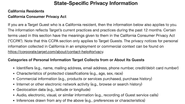Essential Website Policies, Agreements, and Disclosures, Oh My!
Business owners, publishing the right website policies on your site helps limit your liabilities, protects your business, and creates an all-around better customer experience. Some policies are so quick and easy to make it might shock you. Others are business best practices that can help prevent civil lawsuits. A few are even legally required — we’re looking at you: privacy policy.
In this article, we’re focusing on the following seven essential website policies:
- Privacy Policy
- Cookie Policy
- Terms and conditions agreement
- Disclaimers
- Disclosures
- Return Policy
- Shipping Policy
We’ll teach you what each one covers and explain why you should use them all.
What Is a Website Policy?
Website policies set your customers’ expectations by informing them about the procedures, protocols, and requirements you have in place. But they also protect your business from legal disputes or being held accountable for your customers’ actions. Privacy policies, terms and conditions, disclaimers, and even shipping policies are all examples of website policies.
Why Do You Need Them?
Businesses of all sizes benefit from website policies because they help create a better user experience, safeguard you from potential civil actions, and build trust with consumers through transparent business practices. Plus, some policies are legally required if your business falls under the jurisdiction of any data privacy laws.
First, let’s talk about the benefits
Website policies — like terms and conditions, disclaimers, and return and refund policies — help answer many common customer questions, which is more convenient for them and takes the burden off of you.
By posting visible, easy-to-read agreements on your site, your customers know exactly what to expect when they purchase something from you or sign up for your services. Plus, you can use these policies to outline your dispute resolutions, disclaim liabilities, and protect your intellectual property.
Now let’s discuss the legal obligations
Data privacy and consumer protection laws require you to have some website policies in place. For example, the European Union’s General Data Protection Regulation (GDPR) and the recently amended California Consumer Privacy Act (CCPA) can apply to businesses worldwide and obligate you to have a compliant privacy policy. These and other data privacy laws even affect your use of cookies and your cookie policy.
Or, if you endorse products on a blog or have a material relationship with another brand, you’re expected to follow the endorsement guidelines and consumer protections outlined by the Federal Trade Commission, which means posting legally-compliant disclosures.
As a business owner, it’s your responsibility to know what laws apply to you and to follow all legal obligations. Otherwise, you risk receiving significant fines, losing public trust, and a potential decrease in sales.
7 Website Policies You Should Have
Now that you know why you should have website policies posted on your site, let’s talk about what policies are worth publishing — we’ve come up with seven essential agreements, all outlined in greater detail below.
Privacy Policy
A privacy policy tells your website users about your personal data collection practices. This website policy is often legally required and must include information about what type of personal data you collect, how it’s tracked, why you track it, how it gets used, and who it’s shared with or sold to.
There are a bunch of different titles for this policy, like a privacy notice, a privacy clause, a privacy page, or even a privacy agreement. There are also a few ways to make one. You can write it yourself, use a privacy policy template, or use a privacy policy generator to make things really easy.
What matters more than the title, though, is what’s inside the agreement. Make sure yours complies with the regulations outlined by any data privacy laws your business falls under. For example, the screenshot below shows general merchandise retailer Target’s privacy policy, which complies with the amended CCPA.
Do I need a privacy policy on my website?
Some data privacy laws require businesses to post compliant privacy policies, like the GDPR, the CCPA, and the Virginia Consumer Data Protection Act (CDPA). If you fall under the jurisdiction of any of those laws, you need a privacy policy on your website. These laws have an extraterritorial scope, meaning the government can exercise its authority beyond traditional territorial boundaries. Check the legal thresholds to know which ones apply to your website.
Cookie Policy
A cookie policy informs visitors about any internet cookies your website might put on their browsers and explains why you use them. Nearly every website relies on cookies to perform essential functions and improve the customer experience. But they’re also used for targeted advertising and marketing, and data privacy laws heavily regulate those types of cookies.
Do I need a cookie policy on my website?
You might need a cookie policy on your website for data privacy compliance reasons. Under data privacy laws like the amended CCPA, the GDPR, and the CDPA, cookies legally qualify as personal information. So you must explain the type of cookies you use, the methods for obtaining user personal information, and why you’re using them.
Below, see a portion of the cookie policy from Slack, a business messaging platform that must comply with the CCPA.
Besides a cookie policy, you also need to provide users with a way to easily opt into or opt out of cookies, depending on what laws apply to you. You may even have to track and honor their consent preferences.
Terms and Conditions
Every website can benefit from a terms and conditions agreement. It’s the jack-of-all-trades of website policies, as it helps protect your site from abusive or toxic users, outlines your intellectual property rights, and limits your liabilities. It’s also where you can explain payment processes, dispute resolutions, governing laws, and even set the community guidelines and consequences for violating your terms.
Below, you can read the consequences for violating the terms outlined in the video streaming platform YouTube’s terms and conditions agreement.
Do I need a terms and conditions on my website?
While no laws legally require you to have terms and conditions on your website, using one is a business best practice. If a dispute occurs between you and a customer, proving you have an easy-to-read, visible terms and conditions agreement on your site helps your case and may save you thousands in potential legal fees.
Disclaimers
Many types of disclaimers benefit businesses. For example, an advice disclaimer takes liabilities off your plate if you’re an industry professional running a website that gives medical, legal, financial, or other advice.
Ecommerce shops should have product disclaimers to help you avoid legal issues if customers misuse products resulting in injury or other damages.
Or a copyright disclaimer, which genuinely takes only seconds to make and helps deter intellectual property theft. Below, see a standard copyright disclaimer from the hardware store, Lowes, located in the footer of their site, which is the most common place to put this little guy.
Do I need to post disclaimers?
While disclaimers aren’t legally required, they help you communicate your expectations and processes with your consumers, building trust and making everyone’s life much easier.
Disclosures
A disclosure informs your website’s visitors if any links, products, opinions, or experiences are part of a material relationship with another person, brand, or entity.
If you have sponsored posts on your website or use affiliate links, you must follow the FTC endorsement guidelines, which means you must have the proper disclosures. For websites, you must make the disclosure clear and conspicuous, which you can achieve by creating a page that explains what endorsements you’re part of.
See how the popular blog Cupcakes & Cashmere discloses their use of affiliate links in the screenshot below.
Do I need to post disclosures?
Endorsement disclosures are required as part of the consumer protections enforced by the FTC, so don’t get caught without one.
Return Policy
A return policy tells your customers if you accept returns and the process for submitting one. It also gives information about your available refund and exchange options. Below, see a well-organized and comprehensive return policy from the furniture superstore Ikea.
Do I need to a return policy?
Any business that sends goods through the mail should have a return policy posted where customers can easily find it before finalizing a purchase. Why? Nearly half of all shoppers check for a return policy before buying products online. Customers feel more comfortable purchasing something when they know the return policy, especially if they’ve never shopped with you before. Add yours to the footer of your website so people can access it no matter where on your site they end up.
Shipping Policy
Shipping policies explain your businesses’ shipping options and associated costs and estimate how long a product might take to reach a consumer. Amazon structures its shipping policy in a way that’s super easy for customers to find the information they’re looking for.
Similar to a return policy, if you send products to customers through the mail, you should have a shipping policy posted on your website. Customers expect to find one, and if it’s not there, they may worry that buying items from you is too risky. It’s also an efficient way to answer common customer inquiries and helps organize your internal processes. That means it’s a win for you and your customers.
Summary
Now you know the seven essential website policies you need to set your business up for success. From legally required policies to agreements that protect the liabilities of your website and documents that answer common customer service questions, these policies appear on nearly every website for a reason — they genuinely benefit you and your customers.







